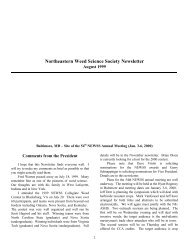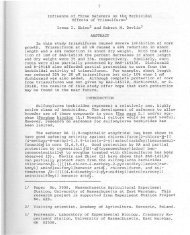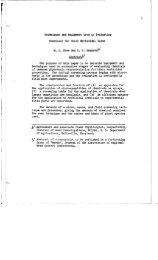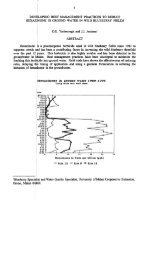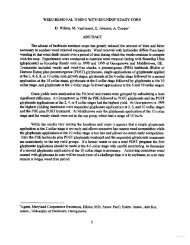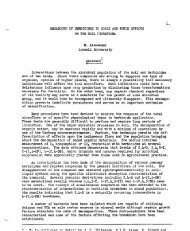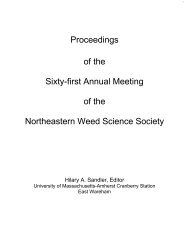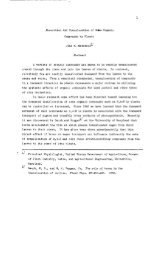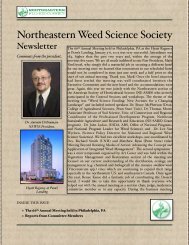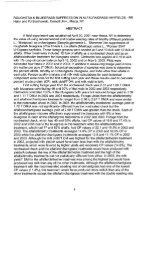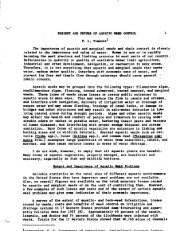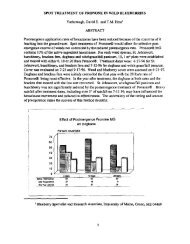- Page 1 and 2:
THE USE OF VEGETATIVECHARACTERISTIC
- Page 3 and 4:
In a few grasses with smooth sheath
- Page 5 and 6:
5. FACTORSINFLUEUCINGTHE PERFORFANC
- Page 7 and 8:
7. The introduction of synthetic or
- Page 9 and 10:
The com;onents the distribution of
- Page 11 and 12:
grains. We early found that the oat
- Page 13 and 14:
13. Atrazine Days following cpm/O.
- Page 15 and 16:
15. not find an abundant production
- Page 17 and 18:
Weed Control In Suburbia 1 Howard H
- Page 19 and 20:
For establishing new lawns, I would
- Page 21 and 22:
Any improvement that you can make i
- Page 23 and 24:
PROMISINGNEWCHEMICALSFORWEEDCONTROL
- Page 25 and 26:
25. Promis ins results have also be
- Page 27 and 28:
27. (Lycbnis alba), cinquefoil (Pot
- Page 29 and 30:
THE EFFECTS OF ADDED PENETRANT AIDS
- Page 31 and 32:
... Surfactant Produced bz: . 31
- Page 33 and 34:
33. 33. of scintillation solution,
- Page 35 and 36:
Table 3. The Net Counts Per Minute
- Page 37 and 38:
The comparisons for lower leaves, s
- Page 39 and 40:
39. SUMMARY Tests using 2-C 14-1abe
- Page 41 and 42:
41. RECENTDEVELOPMENTS IN THEUSE OF
- Page 43 and 44:
second application be made not late
- Page 45 and 46:
45. Combinations of vegadex-Randox
- Page 47 and 48:
11/ Persistence of Soil-Incorporate
- Page 49 and 50:
Plot size varied from 9 sq. ft. to
- Page 51 and 52:
Lower rates of R-1856 were tested o
- Page 53 and 54:
greenhouse tests are listed below.
- Page 55 and 56:
PROGRESSREPORTON LAY-BYUEEDCONTROLI
- Page 57 and 58:
57. Table 1. Effect of sodium silic
- Page 59 and 60:
Sheets (1959) studied, under labora
- Page 61 and 62:
M, ',. • • •• • " ' Treat
- Page 63 and 64:
Figure 1. Relative performance trea
- Page 65 and 66:
A duplicate test was started August
- Page 67 and 68:
67. "he two tests which dealt with
- Page 69 and 70:
69. CONTROLOF WEEDSIN VEGETABLECROP
- Page 71 and 72:
71.' TABLE 3. RESPONSE OF VEGETABLE
- Page 73 and 74:
73. COHBIltit.TloNS' OF cnu:'PITH C
- Page 75 and 76:
75. Results The delay in applicatio
- Page 77 and 78:
77. Summary Logarithmic, tank-mixed
- Page 79 and 80:
(' ( ( Table 1 Rates and Dates of H
- Page 81 and 82:
( ( ( Table 3 Effect of Post-Tran~l
- Page 83 and 84:
( ( ( Table 5 Effect of Lay-By Herb
- Page 85 and 86:
Chemical Weed Control Charles J. No
- Page 87 and 88:
Table I. Weed control, plant stand,
- Page 89 and 90:
Table 1 - Table Beets Pre-plant; Pr
- Page 91 and 92:
91. Chemical Weed Control in Onions
- Page 93 and 94:
93. Table I. l;ced control, plant s
- Page 95 and 96:
95. Results Survey Table I of Hando
- Page 97 and 98:
97. Weed counts were made 3 weeks a
- Page 99 and 100:
99. Third applications were made on
- Page 101 and 102:
1t1. ~ata - Onion stand counts, wee
- Page 103 and 104:
The data in table 2 gives the signi
- Page 105 and 106:
The following effects were noted. 1
- Page 107 and 108:
PRE-fREATINGSOILS, APOSSIBLE.TECfiN
- Page 109 and 110:
· 109. Table 2. The influence of d
- Page 111 and 112:
..... 11 ... - Progress Report on W
- Page 113 and 114:
113. fndothal as a pre-planting inc
- Page 115 and 116:
115~ Table 3. Mean markebab l.e 9£
- Page 117 and 118:
1170 Chemical Weed Control Charles
- Page 119 and 120:
119. Table I .. Weed contrOl! plant
- Page 121 and 122:
121. '- The stand of plants of bo
- Page 123 and 124:
123. Table II. Weed control stand a
- Page 125 and 126:
EFFECTOF SEVERALHERBICIDESONEARLYYI
- Page 127 and 128:
Table 2. Calcula.ted ecre yields of
- Page 129 and 130:
129. - Treatment Average weight per
- Page 131 and 132:
-- The herbicides were applied on J
- Page 133 and 134:
133. Table 2. Effect of pre-plant h
- Page 135 and 136:
- 135. Dim tro for Weed Control in
- Page 137 and 138:
PJ,OORESSREPORT:ON.:WEEJhCGNTROL IN
- Page 139 and 140:
- Simazine 2 and 2 1/2 lb./A and at
- Page 141 and 142:
141. Results - .l2.22 Table 2 shows
- Page 143 and 144:
- !!!! Applications 143. The plots
- Page 145 and 146:
145. Conclusions ADexperiment carri
- Page 147 and 148:
147. Residual herbicide activity wa
- Page 149 and 150:
- Table 1. Herbicides and Rates Use
- Page 151 and 152:
~ __ ( ( ( Table 3. WeedControl on
- Page 153 and 154:
153. TreatiD§ Established Hemlock
- Page 155 and 156:
155. flowering and growth in the sp
- Page 157 and 158:
157. Table 2. Pansy Weed Control (P
- Page 159 and 160:
1590 Table 3. Herbicides Used on Tu
- Page 161 and 162:
------- -------------_._------ ..
- Page 163 and 164:
'. 163. In .Table 3 Co.mpariS01'U$
- Page 165 and 166:
1.65. "'-" Ia.!!l.! ! __!ind_a!!,d_
- Page 167 and 168:
167. Maleic Hydrazide for Weed Cont
- Page 169 and 170:
169. 1. Dana, M. N. Sensitive Fern
- Page 171 and 172:
171. -' Table 1. Amino triazole res
- Page 173 and 174:
1730 Additiona! apple .,samples wer
- Page 175 and 176:
more consistently effective than 5
- Page 177 and 178:
177. HUBICIDES roll YOUNGAPPLE TUES
- Page 179 and 180:
--. Table I. Treatments No. Materia
- Page 181 and 182:
Table 1 -Effect of Granular Formula
- Page 183 and 184:
iss. BVAWATIONor rIVE HEIBICIDES 10
- Page 185 and 186:
PROGRESSREPORT'ON WEEDCONTROL IN CA
- Page 187 and 188:
"'- Table' 1. Herbicide,s Used inCa
- Page 189 and 190:
189. Tabl\7 5. Rating ot BroodIest
- Page 191 and 192:
WEEDGONTROLIN SWBE:rCORNWITHDACTHAL
- Page 193 and 194:
D. FlantinB A!Plication of Thiolcar
- Page 195 and 196:
Table 2. Rainfall, Monmouth, Maine
- Page 197 and 198:
197. Table 4. rercent> Broadlear We
- Page 199 and 200:
1-. . " Table 6. Percent Broad1eaf
- Page 201 and 202:
'\) 0' ,.... • ( ( ( Table 9. Y
- Page 203 and 204:
ANNUALWEEDCONTROLIN POTATOESWITHDNB
- Page 205 and 206:
·205. Percen t Woad Can trol ·196
- Page 207 and 208:
, r t"
- Page 209 and 210:
Table 5. Annual Broadleaf Weed Cont
- Page 211 and 212:
211. Table 9. Effect of fast-Emerge
- Page 213 and 214:
2130 Conclusion There are quite a n
- Page 215 and 216:
SOMERESEARCHANDWEEDCONTROL METHODS
- Page 217 and 218:
-- ,,"I. ,'~; "... TABLEII. EFFECTO
- Page 219 and 220:
( ( ( - -~. , ~ ._w ~~ "PlOOl:tB21.
- Page 221 and 222:
'-~ With respect to asparagus. howe
- Page 223 and 224:
, 1 ,WEEDCONTROLIN ClaTAIN VlGBTABL
- Page 225 and 226:
225 • r '.,':' .TABU: ~~ ... ,WEE
- Page 227 and 228:
227 • . TABLEIV' -' WEED CONTROJ.
- Page 229 and 230:
2290 'of.' .'J • ~ : ~. ... :.' "
- Page 231 and 232:
231. Conclusions The results publis
- Page 233 and 234:
possibility of too severe thinning
- Page 235 and 236:
PRE-EMERGENCEWEEDCONTROLTN ceRN s,
- Page 237 and 238:
INCORPORATED ANDUNINCORPORATED·LIQ
- Page 239 and 240:
( ( ( Table 1. Weed Control Ratings
- Page 241 and 242:
at both weed rating dates at Newark
- Page 243 and 244:
DNBP - Zytron Mixture for Weed Cont
- Page 245 and 246:
~ •• 245. ·Res~1~8 fr.o.George
- Page 247 and 248:
247. Weed Control in Soybeans with
- Page 249 and 250:
249, EFFECTOF HERBICIDESONSEEDPRODU
- Page 251 and 252:
251. TABLE3. EFFECTSOF APPLICATIONS
- Page 253 and 254:
253. almost a week, with treatment
- Page 255 and 256:
( ( ( , Table 1. Effects of Various
- Page 257 and 258:
Table 3. anal.ysi.s of Soil l,esidu
- Page 259 and 260:
Results and Discussion ;llien the f
- Page 261 and 262:
4. Immediate treattlent injury to t
- Page 263 and 264:
( ( ( Table n. :'.!:sti.Jl'ated.'er
- Page 265 and 266:
have very littla real II'+eaningas
- Page 267 and 268:
267. Table 2. Pre-emergence crabgra
- Page 269 and 270:
269 • ..., : Table 1.. 1960, Rain
- Page 271 and 272:
271. Chlordane must be used at rate
- Page 273 and 274:
u • 2 ( ( ( t Table 3. Effect of
- Page 275 and 276:
275. Table 5. Effect. of preemergen
- Page 277 and 278:
277. In one area, the old turf was
- Page 279 and 280:
279. following application. The hig
- Page 281 and 282:
2$1. The standard date of applicati
- Page 283 and 284:
Table 2. Effect of season of applyi
- Page 285 and 286:
L 1-l34B9 ,Jiphenyllactelonitrile o
- Page 287 and 288:
287. Halts F-24, Halts F-26, Halts
- Page 289 and 290:
POST-.EJ.iEhGENCE CONThOLOF CIiABGI
- Page 291 and 292:
,veedone at 4 pounds of tL.cl per a
- Page 293 and 294:
( ( ( Table I. Post-Emergence Contr
- Page 295 and 296:
• •• ., .. • •• ',' •
- Page 297 and 298:
297. compatible with grub-proofing
- Page 299 and 300:
299, Diphenatrile Results During th
- Page 301 and 302:
301. tentative generic name triflur
- Page 303 and 304:
- 1 PRE-ENERGENCE CRABGRASS CONTROL
- Page 305 and 306:
Discussion 30; • a) Pre-emergence
- Page 307 and 308:
307. TABLEI -- Comparison of Produc
- Page 309 and 310:
-' Table II (can't) 309. Stand of S
- Page 312 and 313:
312. THEEFFECTIVENESSOF COMBINATION
- Page 314 and 315:
314. Table 2. Stand Counts and Sile
- Page 316 and 317:
316. planted control before these h
- Page 318 and 319:
Table II. The control of quackgrass
- Page 320 and 321:
320. growing season in the 1957-59
- Page 322 and 323:
322. Table I Main Effects of Cultur
- Page 324 and 325:
324. Atrazine by September 10 when
- Page 326 and 327:
326. Another effect of Atrazine tha
- Page 328 and 329:
32S. Amitrol-T was intermediate in
- Page 330 and 331:
Qolumn Separation: Cellulose. A 24
- Page 332 and 333:
332, Figure -I. Chromatogram of qua
- Page 334 and 335:
334. PRELIMINARYRESULTSONTHE USE OF
- Page 336 and 337:
336. DATEOF BERRYHARVESTAS IT AFFEC
- Page 338 and 339:
within three inches of the soIl sur
- Page 340 and 341:
340 .. The growth ra.te of Horse ne
- Page 342 and 343:
342. dish containing ten seeds bet\
- Page 344 and 345:
344. is not a factor in in It is
- Page 346 and 347:
346 • .Absornt:j.Qn Qn Exchange R
- Page 348 and 349:
348. The' chrona tog ram."WaS first
- Page 350 and 351:
350. PROGRESSREPORTON A STUDYOF THE
- Page 352 and 353:
352. 7. Fluctuating warm and cold w
- Page 354 and 355:
354. A clos.e correlation was found
- Page 356 and 357:
356. 1 THE ANATOMICAL NATUREO:BTHE
- Page 358 and 359:
358. The 2,4,5-TP was most effectiv
- Page 360 and 361:
Table I. Effect. of Pre-emergence T
- Page 362 and 363:
INTRODUCIIOB: THEEFFECTOF WEEDCOMPE
- Page 364 and 365:
1";. 1958 JFab1e I (cont ' d) Treat
- Page 366 and 367:
366. fiE USE OF FENACFOR QUACKGRASS
- Page 368 and 369:
36$. SUMMARY: Based on a I).umber o
- Page 370 and 371:
- Table 1. Chemicals and Rates Used
- Page 372 and 373:
372. On spring plowed plots I where
- Page 374 and 375:
Table 1. Treat.ments Used and Stand
- Page 376 and 377:
37t. PRELIMINARYRESULTSONTHE CONTRO
- Page 378 and 379:
378. CHEMICAL TREATMENTS FORTHECONT
- Page 380 and 381:
Table ;. Visual RatiDgs and Stand C
- Page 382 and 383:
ANN11AL WEEDCONTROL IN SILAGECORN1
- Page 384 and 385:
TABLEI. field Corn tiead Control an
- Page 386 and 387:
Sunderiand,' Mass..Experiment: In t
- Page 388 and 389:
) ) BBLB I. QuackgT88S Control in F
- Page 390 and 391:
TABLEIII. Quackgr888 Control in Fie
- Page 392 and 393:
392. herbicides. In senerel."we.had
- Page 394 and 395:
394. RESULTS§e PISCUSSION In Augus
- Page 396 and 397:
396. WHATHAPPENS TO PHENOXYHERBICID
- Page 398 and 399:
D. TASTEAND ODORSTUDIES Taste and o
- Page 400 and 401:
herbicides produces aquantit.at.ive
- Page 402 and 403:
4('2. • A DECADEOF BRUSHCONl'ROL
- Page 404 and 405:
areas, fre1.uently the crews l'UIrL
- Page 406 and 407:
406. During June and July 1959 a pr
- Page 408 and 409:
408. Numerous chemicals have been u
- Page 410 and 411:
" A Progress Report on Urab * Brush
- Page 412 and 413:
412.
- Page 414 and 415:
414. Urab is an effective chemical
- Page 416 and 417:
416. application. Atrazine has a wa
- Page 418 and 419:
418. COMPARISONOF TECHNIQUESANDSPEC
- Page 420 and 421:
Table I - Results of chemicals appl
- Page 422 and 423:
422. Results and Discussion Data fr
- Page 424 and 425:
424. THE CONNECTICUT ARBORETUM RIGH
- Page 426 and 427: 426. (Kalmia angustifolia) ,huckleb
- Page 428 and 429: 42$. TABLEI (cont'd.) Technique For
- Page 430 and 431: 43". by Leonard and Crafts (15) mos
- Page 432 and 433: 432. awareness of the need for good
- Page 434 and 435: 434. RECOMMENDAT:I"'NS FOR THE USE
- Page 436 and 437: 436. The recommended materials for
- Page 438 and 439: 438. NATURALANDSCAJ:'ING WITHHERBIC
- Page 440 and 441: 440. STATEHIGHWAYHERBICIDE POLICIES
- Page 442 and 443: 442. There is a matter of judgment
- Page 444 and 445: 444. DATAON STATEHIGHWAYHERBICIDE P
- Page 446 and 447: 446. ROADSIDEBRUSHCONTROLWIM PHENOX
- Page 448 and 449: 446. Spraying begins in Connecticut
- Page 450 and 451: Basal applications can be applied e
- Page 452 and 453: 452. UMASSACHUSETTS PROGRESSREPORTO
- Page 454 and 455: 45,4. Again, since the solution is
- Page 456 and 457: 456. Statistics In 1959, the low bi
- Page 458 and 459: 458. formation of seed heads. It wa
- Page 460 and 461: 460. In our northern division, we c
- Page 462 and 463: 462. '. 1. A. 200 ga'l Lons of' wat
- Page 464 and 465: METHODSOF SMIJPLING RAG.hfEED POLLS
- Page 466 and 467: counted. ThJ grqins m~y ba st~inad
- Page 468 and 469: 468. slide moved across the orifi~e
- Page 470 and 471: 470. INTERIMREPORTONAQUATICWEEDCONT
- Page 472 and 473: ,.' f'inal retJuJ.t was that the us
- Page 474 and 475: 474. taste and odor problems. The a
- Page 478 and 479: 478. For example: Imagine, if you:
- Page 480 and 481: enefit of those both us1ng the wate
- Page 482 and 483: • • of ,-, "",jqc. '\:':' ',:,;
- Page 484 and 485: ~ '. r; I ' ':'.' ~, ',;' '.'. 1·"
- Page 486 and 487: 486. weeds increased the food 4.3 t
- Page 488 and 489: ..; . " .," .. ,', oontro..lbe ·oo
- Page 490 and 491: 490. Idee1ly these woUld coVer' foo
- Page 492 and 493: 4')2. Literatm-o Cit~: Biolog:$,cal
- Page 494 and 495: 494. SYSt.:Clil ..:ne sp:aying cont
- Page 496 and 497: 496. 0ll'l;ljing, &hluL ..l V,~l"Y
- Page 498 and 499: etween our sprayine=. operatdons an
- Page 500 and 501: 500. loblolly pine existed iii quat
- Page 502 and 503: 502. 'j' " Using results for all ou
- Page 504 and 505: cut over several year. ,b.elozoe.·
- Page 506 and 507: 506. HARJJ.rlOOD CONTROL WITHMIST B
- Page 508 and 509: 508. distance was achieved. All sub
- Page 510 and 511: 510. Hardwood oontrol within the li
- Page 512 and 513: • J ". 512. ~ ., and the weather
- Page 514 and 515: ) ) ) '.. . . hble). EffectbeneBB o
- Page 516 and 517: 516. HERBICIDf;TECHNIQUE.:> ,FORTn-
- Page 518 and 519: 518. The possibility o:rusing contr
- Page 520 and 521: 520 • . However, the capacity of
- Page 522 and 523: 522. This is followed by planting i
- Page 524 and 525: 524. AQJJATICWEEDCONTROLANDRELATEDP
- Page 526 and 527:
526. findings we increased the amou
- Page 528 and 529:
52e. There is a constant reinfectio
- Page 530 and 531:
530. in 1960 the Potamogeton re-app
- Page 532 and 533:
532. PROGRESSREPORT ON THE FIELD TE
- Page 534 and 535:
534. It· was tht.;n necessary to d
- Page 536 and 537:
536. l.qunlin Hcrbici(.l(; pr-ove-d
- Page 538 and 539:
;538. P.EFEP..ENCES 1. ijOSCIlETTI,
- Page 540 and 541:
540. The oontrol plot was ohosen so
- Page 542 and 543:
542. The dissolved oxygen content r
- Page 544 and 545:
544. Summary 1. Six experimental pl
- Page 546 and 547:
546. A PRELIMINARYREPORTON THE EFFE
- Page 548 and 549:
that either slow chemical hydrolysi
- Page 550 and 551:
550. In July of 1959 funds were mad
- Page 552 and 553:
552. The barge was run at ~ speed o
- Page 554 and 555:
554. areas successfully treated in
- Page 556 and 557:
556. pick~rel spawning suacess but
- Page 558 and 559:
Control of the Pondweed. Potamogeto
- Page 560 and 561:
560. THE ABSORPTIONANDMETABOLISMOF
- Page 562 and 563:
562. in controlling weeds in ponds
- Page 564 and 565:
CommonName WEEDSCONTROLLED ANDAQUAT
- Page 566 and 567:
566. PROGRESS-R!PORT·ON CONTltOLOF
- Page 568 and 569:
568. Herbicides used for these stud
- Page 570 and 571:
570. StHtARy Invasion of Eurasian v
- Page 572 and 573:
AUTHORINDEX(continued) ~ King, -Ken
- Page 574 and 575:
S/I/pg.2 Dinitro (DNOSBP) •• 11
- Page 576:
S/I/4 SUBJECTINDEX{corrt Lnued ) S/



